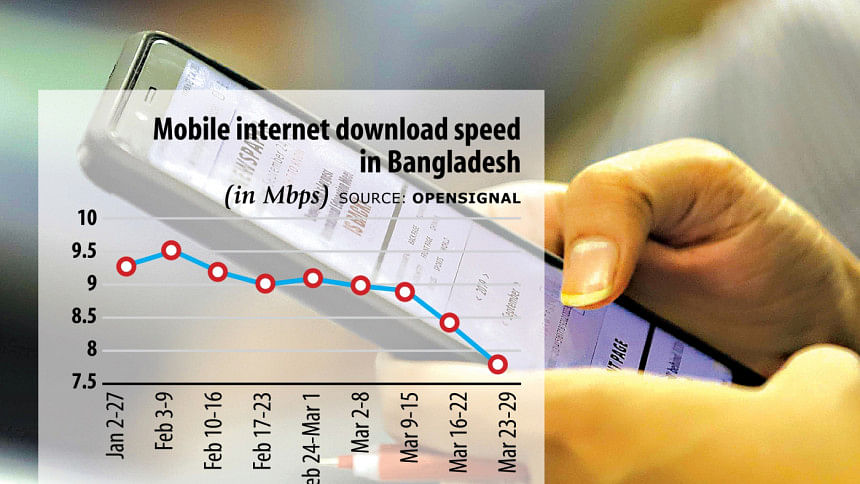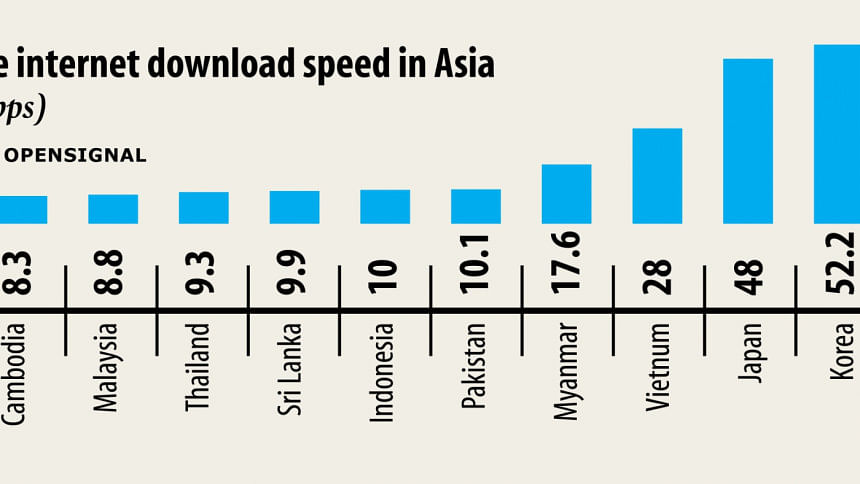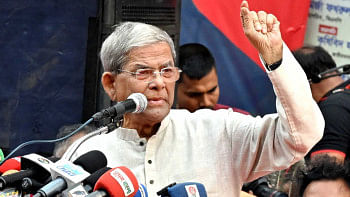Mobile internet slowest in Bangladesh among 42 countries

Mobile internet speed is slowing down in Bangladesh amid the coronavirus pandemic, according to an international study, which has found download speed in the country is the lowest among 42 markets it has covered.
The country's mobile operators said internet use has gone up following the government-announced holiday as people are using more mobile data than before, which has made it hard for them to offer better internet services with the existing spectrum.
In Bangladesh download speed of mobile internet was 9.3 Mbps in the first week of February and it came down to 7.8 Mbps in the last week of March, according to the study, conducted by Opensignal, a Hong Kong-based international mobile analytics organisation specialising in quantifying mobile network experience.
The decline in the internet speed was intensifying gradually after the second week of February, said the report published last week.

Opensignal got the data from its speed testing mobile application that people are using across the globe for assessing the users' network quality.
Since the first confirmed cases of coronavirus were announced in Bangladesh on March 8, internet use rose significantly, especially after the educational institutions were closed and the government declared a long holiday, which has taken a toll on the overall internet speed.
Opensignal analysed 4G download speed across Asia, Europe, the Middle East, Africa, South and Central America, and North America every week between January 27 and March 29.
Of the 42 countries, the download speed the Bangladeshi users were enjoying was of the poorest quality, putting the country at the bottom of the list, while Canadian users were enjoying the highest speed of 61.6 Mbps.
In Asia, South Korea offered the highest speed of 52.1 Mbps, according to the report.
The pandemic, along with its associated medical, social and economic disruptions, is also causing changes to the mobile experience as most of the users in Bangladesh were struggling with the declining speed, it said.
Suddenly a huge population moved from the urban to rural areas and that has caused an extra pressure on the mobile network, said SM Farhad, secretary general of the Association of Mobile Telecom Operators of Bangladesh.
"Operators were offering more mobile data at lesser prices, which attracted many users to stay in the virtual world for a longer period."
Moreover, many people were working from home, while students were opting for online education. More and more people were browsing the internet for entertainment, which resulted in additional data consumption, Farhad said.
"We know, almost 95 per cent of the internet users in Bangladesh depend on mobile data for which adequate spectrum is needed."
But because of the exorbitant prices operators barely afford the spectrum they need to improve on the service quality.
"So, the poor download speed is a cumulative result of all these factors," Farhad added.
Mobile operators said they are facing a crisis in some parts of the country as suddenly demand increased in those areas, which is why they need either time or additional spectrum for network expansion.
To that end, three mobile operators have applied to the Bangladesh Telecommunication Regulatory Commission (BTRC) to allocate them some extra spectrum for the time being, said Md Jahurul Haque, chairman of the regulatory commission.
Robi, Banglalink and Teletalk in a letter to the BTRC sought some spectrum for three months, which the operators said will help them support the customers' growing demand for internet, according to Haque.
The operators, however, did not mention any volume or price for the spectrum.
"The mobile phone companies had earlier talked with me about the issue and I think they have valid points."
On the Opensignal's report, Haque said spectrum shortage is an issue for the poor service quality and if that can be addressed, service quality will improve.
The operators' average 4G speed is still higher than the regulator-announced benchmark but there are some parts of the country where operators cannot ensure quality service.
"BTRC is running speed tests along with other service quality parameters, and if we find anyone guilty of wrongdoings, we will take punitive actions against them," Haque added.
With the declaration of the genereal holiday by the government in the wake of the coronavirus pandemic, the operators saw millions of people leave the capital city, said Shahed Alam, chief corporate and regulatory officer at Robi Axiata.
"Usually such movement takes place during the Eid vacations and we, the operators, chalk out detailed plan to beef up our network in the rural areas to support that kind of voice and data traffic on our network."
Unfortunately, this sudden movement left the operators with no time to take the kind of preparation that was necessary to ensure a smooth network experience.
As people are staying at home due to the holiday, internet use has increased by at least 30 per cent compared with the normal times, Alam said.
"The one way to solve this is to expand our network, but that requires time, which we don't have right now. The only workable alternative is for the government to allow us some additional spectrum that is lying idle so that we can meet the customers' expectations during this crisis," he added.
In another development, the Bangladesh Mobile Phone Users' Association yesterday urged the government to allocate free spectrum to the mobile operators for the time being so that they can offer free internet services to customers.
In a statement, the association placed their demand and said many countries have ensured free telecommunication services to the citizens amid the coronavirus crisis.
"Our government can take the initiative and allocate free spectrum to the carriers enabling them to serve customers for free, which will also help people stay at home," said Mohiuddin Ahmed, president of the association.
Due to the pandemic, voice calls have declined 20 per cent while internet use has increased 25 per cent.
"This causes operators to incur huge revenue losses. So to ensure that people stay at home during this crisis, the government can consider free spectrum allocation," Ahmed added.
Market insiders said governments in different countries have already allocated free spectrum to the mobile phone operators so that they can offer better services to their customers.

 For all latest news, follow The Daily Star's Google News channel.
For all latest news, follow The Daily Star's Google News channel. 



Comments